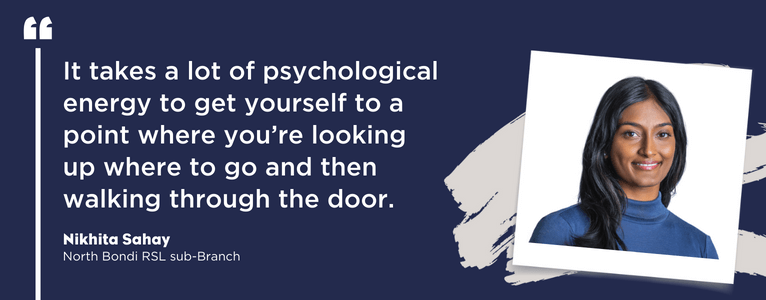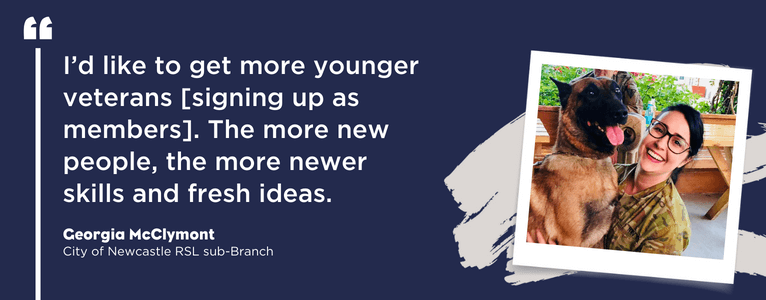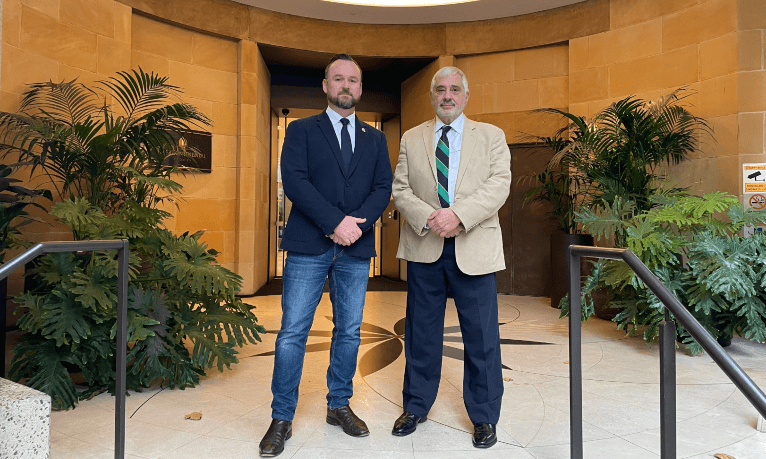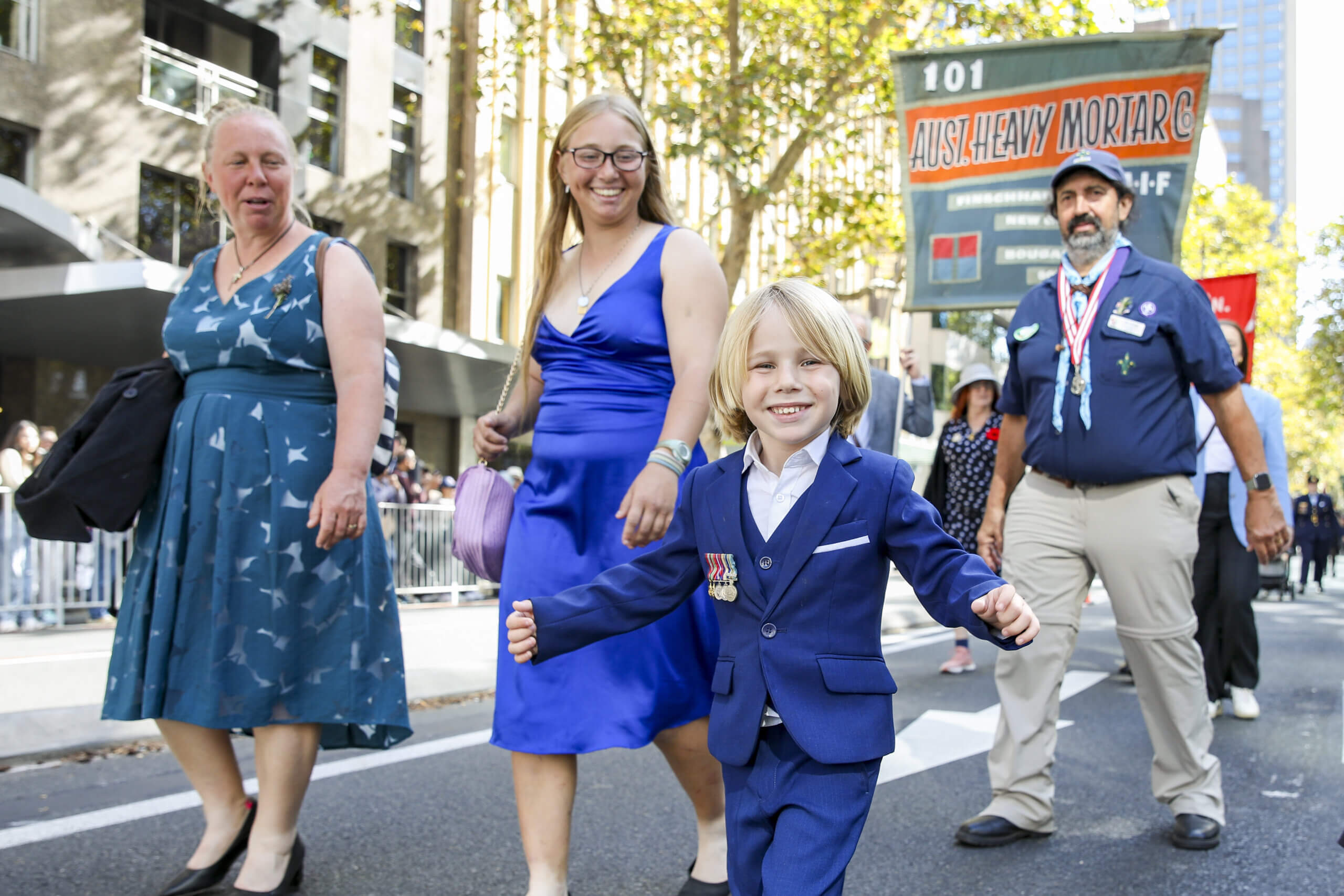What drives these two young veteran leaders?

How Nikhita Sahay and Georgia McClymont are working to provide help to veterans who may not know where to look for it.
By Chris Sheedy
At a glance:
- At the North Bondi RSL sub-Branch, Nikhita Sahay is taking a “deep dive” into the problems facing young veterans, aiming to identify disconnects and workshop solutions.
- “There is no official role description for what I do,” she says. “But my duty is to the [RSL’s] charitable purpose.”
- One of the newest members of the RSL NSW Young Veterans Committee is Navy veteran Georgia McClymont.
- “I want to help streamline services better, get information out to veterans of all ages as best as possible, and create the community that a lot of veterans want,” she explains.
What drives young veteran leaders Nikhita Sahay and Georgia McClymont?
The pair have joined their respective RSL sub-Branches to help platform the unique needs of younger veterans. Both have also stepped up into leadership positions, the former at the North Bondi RSL sub-Branch and the latter as part of the RSL NSW Young Veterans Committee (YVC).
Here, Sahay and McClymont share some of the challenges transitioning out of Defence and joining a sub-Branch, and how they’re working to provide help to veterans who may not know where to look for it.
“My duty is to the [RSL’s] charitable purpose”
Sometimes, the services and processes in place to help veterans, servicepeople and their families simply don’t land properly, according to Nikhita Sahay, a member of North Bondi RSL sub-Branch.
Consider someone whose partner is being deployed for the first time and has no idea where to turn for support, or how to cope with the hole the deployment leaves in their family.
Of course, there are several services that offer such support, but the individual hasn’t necessarily been told about any of them. Therefore, they haven’t “landed properly”, says Sahay.
In her community engagement role at the North Bondi RSL sub-Branch, Sahay has the freedom to take a deep dive into such problems, to identify the disconnects and to workshop solutions.
She might have found herself similarly looking for support had she not been surrounded by a strong family framework when she was medically discharged.

The care process at the National Centre for Veterans’ Healthcare (NCVH) led her on to the RSL LifeCare Spur Equine Program, which Sahay says is “a Trojan horse” for veteran welfare.
“It’s how you get people in the door,” she says. “That’s definitely an Army culture thing … Most people aren’t going to make an advocate appointment or walk into wellbeing centres.
“It takes a lot of psychological energy to get yourself to a point where you’re looking up where to go and then walking through the door and then thinking about what you’re going to say.”
“Whereas, there’s a side door through this Trojan horse, because horses are sexy and marketable, and everybody wants to pat a horse.
“It’s also a place where people are going to go regardless of how they feel about the RSL or their service.”
Similarly, when Sahay began volunteering at the Spur Equine Program, it served as her own Trojan horse into the world of the RSL, which is Australia’s largest veteran support charity.
“I fell in love with the horses and met people through the RSL that way,” she says.
“There is no official role description for what I do. But my duty is to the [RSL’s] charitable purpose.
“In a lot of ESOs, particularly the larger ones, in an effort to achieve scale they lose personability and nuance. That’s where you get inappropriate outcomes.
“My position is looking at having a really intimate understanding of the problem, also having an understanding of what already exists in the solution space, and making connections to make sure that the right things are happening.”
“The people in the sub-Branch have been very supportive”
A calling to help others has always directed Georgia McClymont’s choices.
It’s why she enlisted in the Navy, with the intention of seeking a specialisation in underwater medicine a year after finishing high school. It’s the reason she served for seven years, including six months at a NATO hospital in Afghanistan and a humanitarian aid deployment in partnership with US forces to various Pacific Islands.
And it was also the motivation behind her choice to seek a seat on the YVC.
“When you’re in Defence, it’s such a close-knit community,” says McClymont, who now works as an Occupational Health Adviser at a steel manufacturer in Newcastle.
“Whether you’re enjoying the day-to-day or not, you’re still part of the family. And when you leave, you leave that behind, and you don’t often regain it in other employment. So there’s always a part that’s missing.
“My job at the moment is close to home. I get paid well and it’s a good company, but I still miss helping my community and colleagues. That has drawn me to helping out with the RSL and the YVC, because there just seems to be more that I can do.”

Perhaps it’s to do with having spent seven years looking out for her colleagues in the Navy, or the fact that her mother is a nurse. Whatever it is, says McClymont, the urge to help others is strong.
When they’re needing assistance outside the military, she says, many veterans don’t know where to start looking. And it’s often difficult to tell the difference between agencies set up to offer free assistance to veterans, and businesses that are more interested in a slice of any compensation offered.
That’s why she joined the City of Newcastle RSL sub-Branch.
“The people in the sub-Branch have been very supportive,” she says. “I’d like to get more younger veterans [signing up as members] applying. The more new people, the more newer skills and fresh ideas.
“After going to the RSL NSW State Congress and AGM, I’ve realised there are a lot of other sub-Branches that are also doing great things. I want to be involved to make sure my sub-Branch is also trying to achieve those same goals.
“I want to help streamline services better, get information out to veterans of all ages as best as possible, and create the community that a lot of veterans want.”







